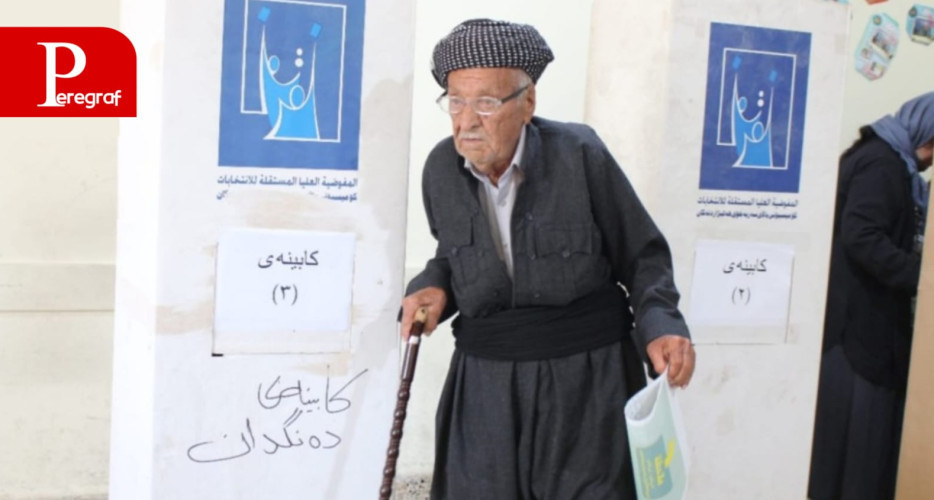Elections by the Numbers: 303 Kurdistan Region Candidates Awaiting Three Million Voters

Peregraf- The clock is ticking toward Iraq’s sixth parliamentary elections, scheduled for November 11, 2025. Campaigning began on October 3rd and will continue until November 8th, with candidates and parties mobilizing across the country. This election will be one of the largest in Iraq’s history, with more than 21 million eligible voters nationwide and over three million of them registered in the Kurdistan Region.
According to official statistics released by the Independent High Electoral Commission (IHEC), 21,404,291 citizens with biometric registrations are eligible to vote. Of these, 3,068,384 voters come from the three provinces of the Kurdistan Region—Erbil, Sulaymaniyah, and Duhok—representing 14.3% of Iraq’s total electorate.
Across Iraq, 7,768 candidates will compete for seats in the 329-member parliament. Of these, 5,520 are men (71%) and 2,248 are women (29%). Within the Kurdistan Region itself, 303 candidates are in the race, representing both the major political parties and smaller groupings, as well as independents.
The Kurdistan Democratic Party (KDP) tops the list with 88 candidates, followed by the Patriotic Union of Kurdistan (PUK) with 71, the "Rawti Halwest" (Stance Movement) with 32, New Generation with 25, the People’s Front with 20, the Kurdistan Islamic Union with 16, the Kurdistan Justice Group with 14, the Social Democratic Party with 13, and the Iraqi Turkmen Front with nine. In addition, 15 individuals are contesting independently outside of party lists.
The three Kurdistan provinces together are allocated 46 seats in the Iraqi Parliament. Of these, two seats—one each in Erbil and Duhok—are reserved for the Christian quota. No quota seats for minorities exist in the Sulaymaniyah constituency.
Sulaymaniyah Constituency
The Sulaymaniyah constituency, which also includes Halabja province and the administrations of Garmian and Raparin, is the largest electoral district in the Kurdistan Region. With 1,201,658 registered voters, it accounts for 39.1% of the Kurdistan Region’s electorate. This constituency has been allocated 18 parliamentary seats, contested by 136 candidates.
Candidates in Sulaymaniyah:
-
PUK: 36
-
KDP: 36
-
Rawti Halwest: 16
-
New Generation: 12
-
People’s Front: 11
-
Kurdistan Islamic Union: 8
-
Kurdistan Justice Group: 5
-
Social Democratic Party: 4
-
Iraqi Turkmen Front: 4
-
Independents: 4
Erbil Constituency
Erbil, the capital of the Kurdistan Region, is the second-largest electoral district with 1,087,880 voters—35.5% of the region’s total. Sixteen parliamentary seats have been assigned to this constituency, where 108 candidates are competing.
Candidates in Erbil:
-
KDP: 30
-
PUK: 30
-
Rawti Halwest: 12
-
New Generation: 8
-
Kurdistan Justice Group: 5
-
Iraqi Turkmen Front: 5
-
Kurdistan Islamic Union: 4
-
People’s Front: 4
-
Social Democratic Party: 4
-
Independents: 6
Duhok Constituency
Duhok is the smallest constituency in the Kurdistan Region, with 778,846 registered voters, representing 25.4% of the region’s total. The province has 12 parliamentary seats, contested by 59 candidates.
Candidates in Duhok:
-
KDP: 22
-
PUK: 5
-
New Generation: 5
-
People’s Front: 5
-
Social Democratic Party: 5
-
Kurdistan Islamic Union: 4
-
Kurdistan Justice Group: 4
-
Rawti Halwest: 4
-
Independents: 5
Disputed Territories
Beyond the Kurdistan Region’s formal administration, Kurdish parties are also active in the disputed territories of Kirkuk, Nineveh, and Diyala, where hundreds of thousands of Kurdish voters reside. A total of 164 Kurdish candidates are competing in these provinces:
-
Kirkuk (60 candidates): PUK (24), KDP (24), New Generation (7), People’s Front (5)
-
Nineveh (68 candidates): KDP (61), New Generation (7)
-
Diyala (36 candidates): PUK (27), New Generation (4), Social Democratic Party (5)
Special and Displaced Voters
According to IHEC, Iraq has 1,313,980 special voters, including security personnel and armed forces, making up 6% of the total electorate. Of these, 224,333 are from the Kurdistan Region, representing 17% of Iraq’s special voters.
The number of internally displaced voters is significantly smaller. Nationwide, there are 26,538 displaced voters, most of whom reside in Nineveh. Kirkuk has 49 displaced voters, Salahaddin 35, and none are officially registered in the Kurdistan Region provinces.
Parliamentary Seat Distribution
The Iraqi Parliament has 329 seats, of which 25% (83 seats) are reserved for women, and nine seats are set aside for minority communities. The Kurdistan Region holds 46 seats in total: 18 for Sulaymaniyah, 16 for Erbil, and 12 for Duhok.
Although Halabja has provincial status, it is not yet designated as an independent electoral constituency and remains part of Sulaymaniyah for this election. Future elections are expected to allocate Halabja its own seats.
For the first time, Iraq is using the proportional representation system based on the modified Sainte-Laguë method (factor 1.7) instead of the previous "largest remainder" formula. Electoral experts argue this system favors larger political forces and established parties, while disadvantaging smaller parties and independent candidates.
This election, therefore, is not only a numbers game—measured in voters, candidates, and seats—but also a test of political strength, strategy, and representation. With more than three million voters in the Kurdistan Region and 303 candidates vying for their support, the outcome will significantly shape the role of Kurdish representation in Baghdad’s next parliament.